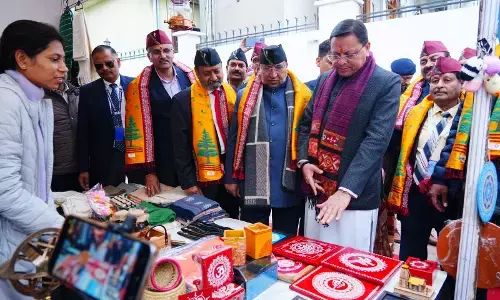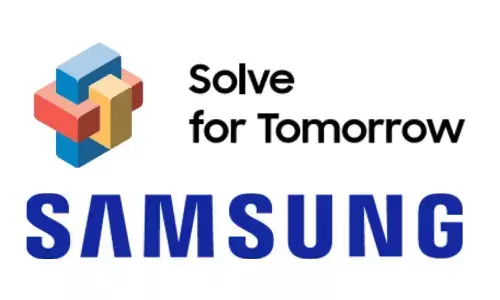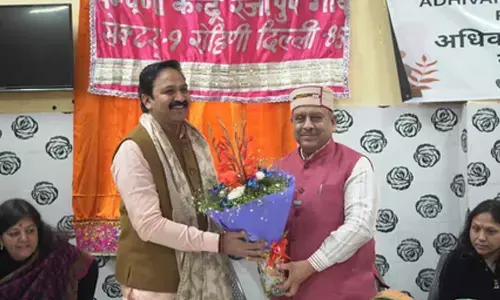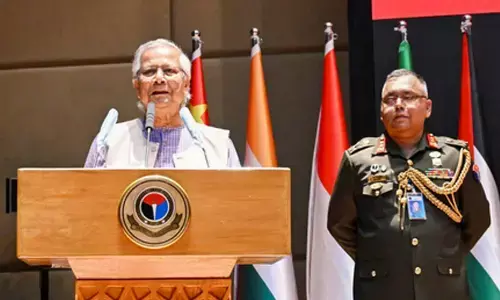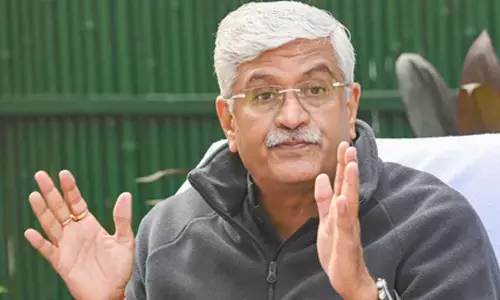Free gift to voters will corrupt; but is not a 'corrupt practice'?

 Here are two statements: 1. An individual cannot promise voters to give something free or give cash in return for voting. 2. But a political party can declare in its manifesto that it would transfer cash if voted to power or give something free of cost from the exchequer!
Here are two statements: 1. An individual cannot promise voters to give something free or give cash in return for voting. 2. But a political party can declare in its manifesto that it would transfer cash if voted to power or give something free of cost from the exchequer!
The 1st statement means corrupt practice under Section 123 of the Representation of People Act, but the second is not. That is the essence of law existing now, as explained by the Supreme Court in following terms: "The manifesto of a political party is a statement of its policy. The question of implementing the manifesto will arise only if the party forms a government. It is the promise of a future government. It is not a promise of an individual candidate. Section 123 of the RP Act and other relevant provisions, upon their true construction; contemplate corrupt practice by an individual candidate or his agent.
"Moreover, such a corrupt practice is directly linked to his own election irrespective of whether his party forms a government or not. The provisions of the RP Act clearly draw a distinction between an individual candidate put up by a party and the political party as such. "The provisions of the Act prohibit an individual candidate from resorting to promises, which constitute a corrupt practice within the meaning of Section 123. The provisions of the Act place no fetters on the power of the political parties to make promises in the manifesto."
For sociological reasons and on moral grounds the court did not agree with doling out such gifts like colour TV sets, grinders, mixies, laptops, etc., to voters, but the Supreme Court did not find any law to say it was not constitutional or illegal or anti-democratic.
A political party can do what an individual can't do. Why not political parties give these free gifts by buying them with their own money? Why should they promise to give things free to the people at the cost of people? Is it philanthropic for a political party to donate public money to the people in general?
Certainly it is a major problem that upsets the democratic polity. But Supreme Court says the answer lies somewhere else, not with them. Neither the Supreme Court nor the Election Commission has any role to play in curbing this malpractice. Though technically it is not a corrupt practice under law, it certainly disturbs the level playing field in elections, economy and unduly influences the voters to cast their votes in their favour.
The Tamil Nadu government argued that television has a lot of positive effects and influences on our society and culture. Television gives helpful information and it is not an equipment aimed for entertainment alone. It was also asserted that the purpose of distributing colour television sets is not restricted to providing recreation but [extends] to provide general knowledge to the people, more particularly, to the household women � ."
But none can extend such argument to wet grinder and fridge. The apex court was not inclined to agree with the argument that giving of colour TVs, laptops, mixer-grinders, etc, by the government after adhering to due process is not an expense for public purpose.
A great maxim of political governance and good economy is "don't give fish but teach fishing". We have to build a nation of citizens with respect and not groups of beggars waiting in queue for free gifts without bothering about self respect. It also affect level playing field. A party which cannot afford or which believes in principle that such unscrupulous offers are undemocratic will lose even before the poll begins. A Bench of Justices P. Sathasivam and Ranjan Gogoi rightly observed on July 4, 2013: "Freebies shake the root of free and fair elections to a large degree."
There is no authority to regulate political parties. The Election Commission of India is a tiger only after issuing notification of elections, and can do nothing before or after it. Like a clerk it registers a political party but cannot deregister a party which became defunct and never contested any election for a particular period. Income tax exemption is total and absolute for a political party.
There are instances where political party is floated not for contesting elections but to collect huge donations and enjoy total tax exemption from tax. An NGO may be accountable, but an NGO-turned Political Party can amass money and be not accountable and answerable. A political party itself can be a tax heaven and storehouse of black money. It can spend huge money to influence voters but that will not fall under the prohibitive expenditure limits imposed by law. Expenditure of political party is not part of the account of that party's candidate. They can claim that they are not answerable to give information.
To invalidate the recent judgment of the Central Information Commission, the Government of India preparing to come out with an ordinance to take out political parties from the ambit of Right to Information Act. Not only the proposing UPA but non-0pposing opposition share the shamelessness in proclaiming that they will not give their information to public though claim to be public servants.
And, above all, according to latest judgment of the Supreme Court, they can influence the voters in polls where contestants are denied level playing field, through free gift promises. It is real lawlessness of law makers or government givers; one could see but not stop. Considering that "there is no enactment that directly governs the contents of the manifesto," the Supreme Court Bench directed the Election Commission to frame guidelines for the same in consultation with all recognized parties. A separate head for manifesto guidelines could be included in the Model Code of Conduct for the Guidance of Political Parties and Candidates.
The apex court is mindful of the fact that generally parties release their manifesto before the announcement of the election date: in that scenario the Election Commission will not have the authority to regulate any act which is done before the announcement of the date. The court suggested that an exception could be made in this regard as the purpose of the manifesto is directly associated with the election process." Judicial interference is permissible when the action of the government is unconstitutional and not when such action is not wise or that the extent of expenditure is not for the good of the state.
All such questions must be debated and decided in the legislature and not in court, rightly said the court. The Bench considered the need for a separate law governing the political parties. It directed the Commission to take up this task as early as possible considering its importance. Whether legislature has will and interest in passing such law? It's a shame that political parties show unbelievable unity when it comes to protection of their vested interests. There is no surprise if they make a law to remove the basis of Supreme Courts observation and to say every political party should have a freedom of promising whatever they want in their manifestos and also to say that those manifestos could not be enforced in courts of law.
(The writer is Professor and Coordinator, Center for Media Law & Public Policy, NALSAR University of Law, Hyderabad)








